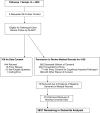Comorbid depression is associated with an increased risk of dementia diagnosis in patients with diabetes: a prospective cohort study
- PMID: 20108126
- PMCID: PMC2855007
- DOI: 10.1007/s11606-009-1248-6
Comorbid depression is associated with an increased risk of dementia diagnosis in patients with diabetes: a prospective cohort study
Abstract
Background: Both depression and diabetes have been found to be risk factors for dementia. This study examined whether comorbid depression in patients with diabetes increases the risk for dementia compared to those with diabetes alone.
Methods: We conducted a prospective cohort study of 3,837 primary care patients with diabetes (mean age 63.2 +/- 13.2 years) enrolled in an HMO in Washington State. The Patient Health Questionnaire (PHQ-9) was used to assess depression at baseline, and ICD-9 diagnoses for dementia were used to identify cases of dementia. Cohort members with no previous ICD-9 diagnosis of dementia prior to baseline were followed for a 5-year period. The risk of dementia for patients with both major depression and diabetes at baseline relative to patients with diabetes alone was estimated using cause-specific Cox proportional hazard regression models that adjusted for age, gender, education, race/ethnicity, diabetes duration, treatment with insulin, diabetes complications, nondiabetes-related medical comorbidity, hypertension, BMI, physical inactivity, smoking, HbA(1c), and number of primary care visits per month.
Results: Over the 5-year period, 36 of 455 (7.9%) patients with major depression and diabetes (incidence rate of 21.5 per 1,000 person-years) versus 163 of 3,382 (4.8%) patients with diabetes alone (incidence rate of 11.8 per 1,000 person-years) had one or more ICD-9 diagnoses of dementia. Patients with comorbid major depression had an increased risk of dementia (fully adjusted hazard ratio 2.69, 95% CI 1.77, 4.07).
Conclusions: Patients with major depression and diabetes had an increased risk of development of dementia compared to those with diabetes alone. These data add to recent findings showing that depression was associated with an increased risk of macrovascular and microvascular complications in patients with diabetes.
Figures
Similar articles
-
The association of comorbid depression with intensive care unit admission in patients with diabetes: a prospective cohort study.Psychosomatics. 2011 Mar-Apr;52(2):117-26. doi: 10.1016/j.psym.2010.12.020. Psychosomatics. 2011. PMID: 21397103 Free PMC article.
-
Depression and diabetes: factors associated with major depression at five-year follow-up.Psychosomatics. 2009 Nov-Dec;50(6):570-9. doi: 10.1176/appi.psy.50.6.570. Psychosomatics. 2009. PMID: 19996227 Free PMC article.
-
Association of depression with increased risk of dementia in patients with type 2 diabetes: the Diabetes and Aging Study.Arch Gen Psychiatry. 2012 Apr;69(4):410-7. doi: 10.1001/archgenpsychiatry.2011.154. Epub 2011 Dec 5. Arch Gen Psychiatry. 2012. PMID: 22147809 Free PMC article.
-
Depression, stroke, and dementia in patients with myocardial infarction.Dan Med J. 2018 Apr;65(4):B5423. Dan Med J. 2018. PMID: 29619929 Review.
-
The comorbidity between depression and diabetes.Curr Psychiatry Rep. 2013 Sep;15(9):390. doi: 10.1007/s11920-013-0390-3. Curr Psychiatry Rep. 2013. PMID: 23933977 Review.
Cited by
-
Depression and death in diabetes; 10-year follow-up of all-cause and cause-specific mortality in a diabetic cohort.Psychosomatics. 2013 Sep-Oct;54(5):428-36. doi: 10.1016/j.psym.2013.02.015. Epub 2013 Jun 4. Psychosomatics. 2013. PMID: 23756124 Free PMC article.
-
Birth in High Infant Mortality States and Dementia Risk in a Cohort of Elderly African American and White Health Care Members.Alzheimer Dis Assoc Disord. 2019 Jan-Mar;33(1):1-6. doi: 10.1097/WAD.0000000000000270. Alzheimer Dis Assoc Disord. 2019. PMID: 30106754 Free PMC article.
-
Reproductive period and risk of dementia in a diverse cohort of health care members.Neurology. 2019 Apr 23;92(17):e2005-e2014. doi: 10.1212/WNL.0000000000007326. Epub 2019 Mar 28. Neurology. 2019. PMID: 30923235 Free PMC article.
-
The association between intensive care unit admission and subsequent depression in patients with diabetes.Int J Geriatr Psychiatry. 2012 Jan;27(1):22-30. doi: 10.1002/gps.2684. Epub 2011 Feb 9. Int J Geriatr Psychiatry. 2012. PMID: 21308790 Free PMC article.
-
Comorbidity between major depressive disorder and physical diseases: a comprehensive review of epidemiology, mechanisms and management.World Psychiatry. 2023 Oct;22(3):366-387. doi: 10.1002/wps.21110. World Psychiatry. 2023. PMID: 37713568 Free PMC article.
References
-
- Corsentino EA, Sawyer K, Sachs-Ericsson N, Blazer DG. Depressive symptoms moderate the influence of the apolipoproteine epsilon4 allele on cognitive decline in a sample of community dwelling older adults. Am J Geriatr Psychiatry. 2009;17:155–165. doi: 10.1097/JGP.0b013e31818f3a6b. - DOI - PMC - PubMed
Publication types
MeSH terms
Grants and funding
LinkOut - more resources
Full Text Sources
Medical
Miscellaneous


